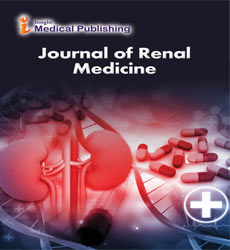Diagnosis and Symptomatology of Renal Hypertension Untangling the Mysteries
Kant Nattaya*
Department of Renal Medicine, University of Colorado School of Medicine, Aurora, USA
- *Corresponding Author:
- Kant Nattaya
Department of Renal Medicine,
University of Colorado School of Medicine, Aurora,
USA,
E-mail: nattaya@foxmail.com
Received date: February 26, 2024, Manuscript No. IPJRM-24-18924; Editor assigned date: February 29, 2024, PreQC No. IPJRM-24-18924 (PQ); Reviewed date: March 14, 2024, QC No. IPJRM-24-18924; Revised date: March 21, 2024, Manuscript No. IPJRM-24-18924 (R); Published date: March 28, 2024, DOI: 10.36648/ipjrm.7.2.20
Citation: Nattaya K (2024) Diagnosis and Symptomatology of Renal Hypertension Untangling the Mysteries. Jour Ren Med Vol.7 No.2: 20.
Description
Renal hypertension, also known as renovascular hypertension, is a type of secondary hypertension caused by abnormalities in the kidneys. This condition affects the blood vessels supplying the kidneys, leading to high blood pressure. Understanding the causes, symptoms, diagnosis, and treatment options for renal hypertension is crucial for effective management and prevention of complications. Renal hypertension is a significant contributor to cardiovascular morbidity and mortality, emphasizing the importance of early detection and management. Encouraging lifestyle modifications, appropriate medication management, and timely interventions for underlying renal artery abnormalities can help control blood pressure, preserve kidney function, and reduce the risk of complications associated with renal hypertension.
Renal hypertension
Renal hypertension can be caused by various factors that affect the blood flow to the kidneys or the Renin-Angiotensin- Aldosterone System (RAAS). Some common causes include: Narrowing of the renal arteries due to atherosclerosis, fibromuscular dysplasia, or other vascular diseases can reduce blood flow to the kidneys, triggering hypertension. Conditions such as Chronic Kidney Disease (CKD), Polycystic Kidney Disease (PKD), or glomerulonephritis can impair kidney function and disrupt blood pressure regulation. Rarely, tumors in the kidney or adrenal glands can produce excessive amounts of renin, a hormone that regulates blood pressure, leading to hypertension. Blood clots blocking the renal arteries can result in decreased blood flow to the kidneys, causing hypertension and kidney damage. Renal hypertension often does not cause noticeable symptoms in its early stages, earning it the nickname silent killer. However, as the condition progresses, individuals may experience symptoms such as persistent high blood pressure may indicate renal hypertension, especially if resistant to standard antihypertensive medications. Fluctuations in blood pressure renal hypertension may cause blood pressure to fluctuate significantly, leading to sudden spikes or drops in blood pressure levels. Some individuals may experience symptoms related to kidney dysfunction, such as decreased urine output, swelling in the legs or ankles, and fatigue. Prolonged hypertension can strain the heart and lead to symptoms like chest pain, shortness of breath, or palpitations. Diagnosing renal hypertension involves a combination of medical history review, physical examination, and diagnostic tests to assess kidney function and identify underlying causes. Diagnostic procedures commonly used include blood pressure monitoring regular blood pressure measurements help identify persistent hypertension and monitor changes over time. Blood tests can assess kidney function by measuring serum creatinine, Blood Urea Nitrogen (BUN), and electrolyte levels. Analysis of urine samples can detect abnormalities such as proteinuria, hematuria, or abnormalities in electrolyte excretion, indicating kidney dysfunction. Imaging tests such as renal ultrasound, Computed Tomography Angiography (CTA), or Magnetic Resonance Angiography (MRA) can visualize the renal arteries and identify any structural abnormalities or blockages. Invasive angiographic procedures may be performed to directly visualize the renal arteries and assess blood flow, particularly in cases where other imaging studies are inconclusive.
Treatment of renal hypertension
The management of renal hypertension aims to control blood pressure, preserve kidney function, and reduce the risk of complications such as heart disease and stroke. Treatment strategies may include lifestyle modifications they are dopting a healthy lifestyle can help lower blood pressure and improve overall health. Recommendations may include weight loss, regular exercise, dietary changes, quitting smoking, and limiting alcohol consumption. Medications like antihypertensive medications are commonly prescribed to control blood pressure in individuals with renal hypertension. These may include Angiotensin-Converting Enzyme (ACE) inhibitors, Angiotensin IÐ? Receptor Blockers (ARBs), diuretics, beta-blockers, or calcium channel blockers. In cases of renal artery stenosis causing severe hypertension or kidney dysfunction, revascularization procedures such as angioplasty with stent placement or surgical revascularization may be considered to restore blood flow to the kidneys. Addressing underlying conditions contributing to renal hypertension, such as chronic kidney disease, polycystic kidney disease, or renal artery thrombosis, is essential for comprehensive management. Regular medical evaluations and monitoring of blood pressure, kidney function, and medication effectiveness are crucial to adjust treatment plans as needed and prevent complications.
Open Access Journals
- Aquaculture & Veterinary Science
- Chemistry & Chemical Sciences
- Clinical Sciences
- Engineering
- General Science
- Genetics & Molecular Biology
- Health Care & Nursing
- Immunology & Microbiology
- Materials Science
- Mathematics & Physics
- Medical Sciences
- Neurology & Psychiatry
- Oncology & Cancer Science
- Pharmaceutical Sciences
